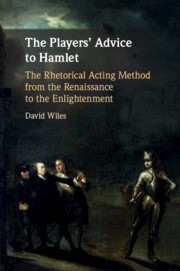 The Players' Advice to Hamlet
The Players' Advice to Hamlet Published online by Cambridge University Press: 16 January 2020
In this chapter I show how the job of the Baroque actor was to embellish the dramatic poem, and as it were to colour in the outline provided by the text. Actor and writer: Racine coached young actresses in exactly how to deliver his lines, but experienced actors wanted more autonomy. ‘Action’ in sacred oratory: Louis de Crésolles’ Jesuit treatise on acting atomized the body, and allowed Christians to think in a technical way about their performance methods, but Le Faucheur’s Protestant manual placed more emphasis on authenticity of feeling. Mondory and Corneille: A reading of Le Cid reveals the physicality and emotionalism expected of the celebrity lead actor, in a balance of power between actor and writer that would subsequently be eroded. The first manuals dedicated to stage acting: Perrucci and Gildon look back to seventeenth-century practice, as does Jean Poisson, the first professional actor to offer advice about performance to non-actors in a printed manual of 1717. Another actor, Luigi Riccoboni, in 1728 published a manifesto for novice Italian actors, warning them against French formalism and arguing for the primacy of feeling. He is less interested in the work of the voice, and more concerned with the way feeling operates on the body.
To save this book to your Kindle, first ensure no-reply@cambridge.org is added to your Approved Personal Document E-mail List under your Personal Document Settings on the Manage Your Content and Devices page of your Amazon account. Then enter the ‘name’ part of your Kindle email address below. Find out more about saving to your Kindle.
Note you can select to save to either the @free.kindle.com or @kindle.com variations. ‘@free.kindle.com’ emails are free but can only be saved to your device when it is connected to wi-fi. ‘@kindle.com’ emails can be delivered even when you are not connected to wi-fi, but note that service fees apply.
Find out more about the Kindle Personal Document Service.
To save content items to your account, please confirm that you agree to abide by our usage policies. If this is the first time you use this feature, you will be asked to authorise Cambridge Core to connect with your account. Find out more about saving content to Dropbox.
To save content items to your account, please confirm that you agree to abide by our usage policies. If this is the first time you use this feature, you will be asked to authorise Cambridge Core to connect with your account. Find out more about saving content to Google Drive.